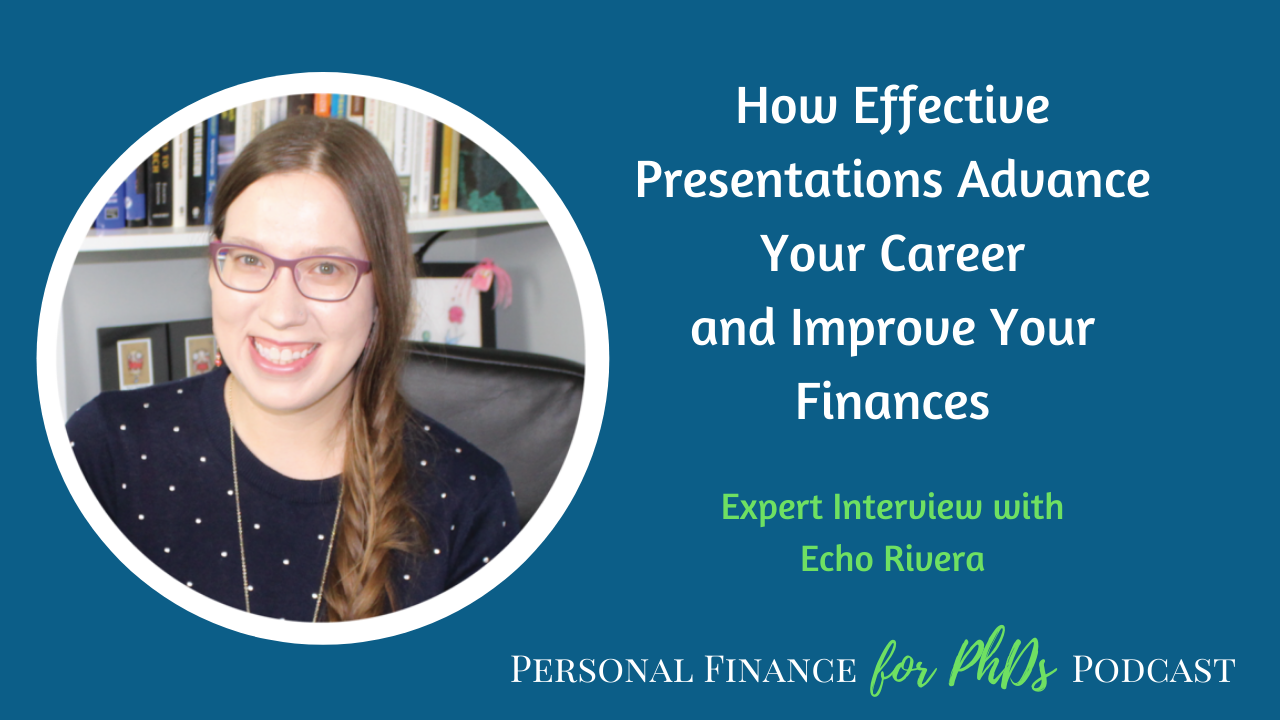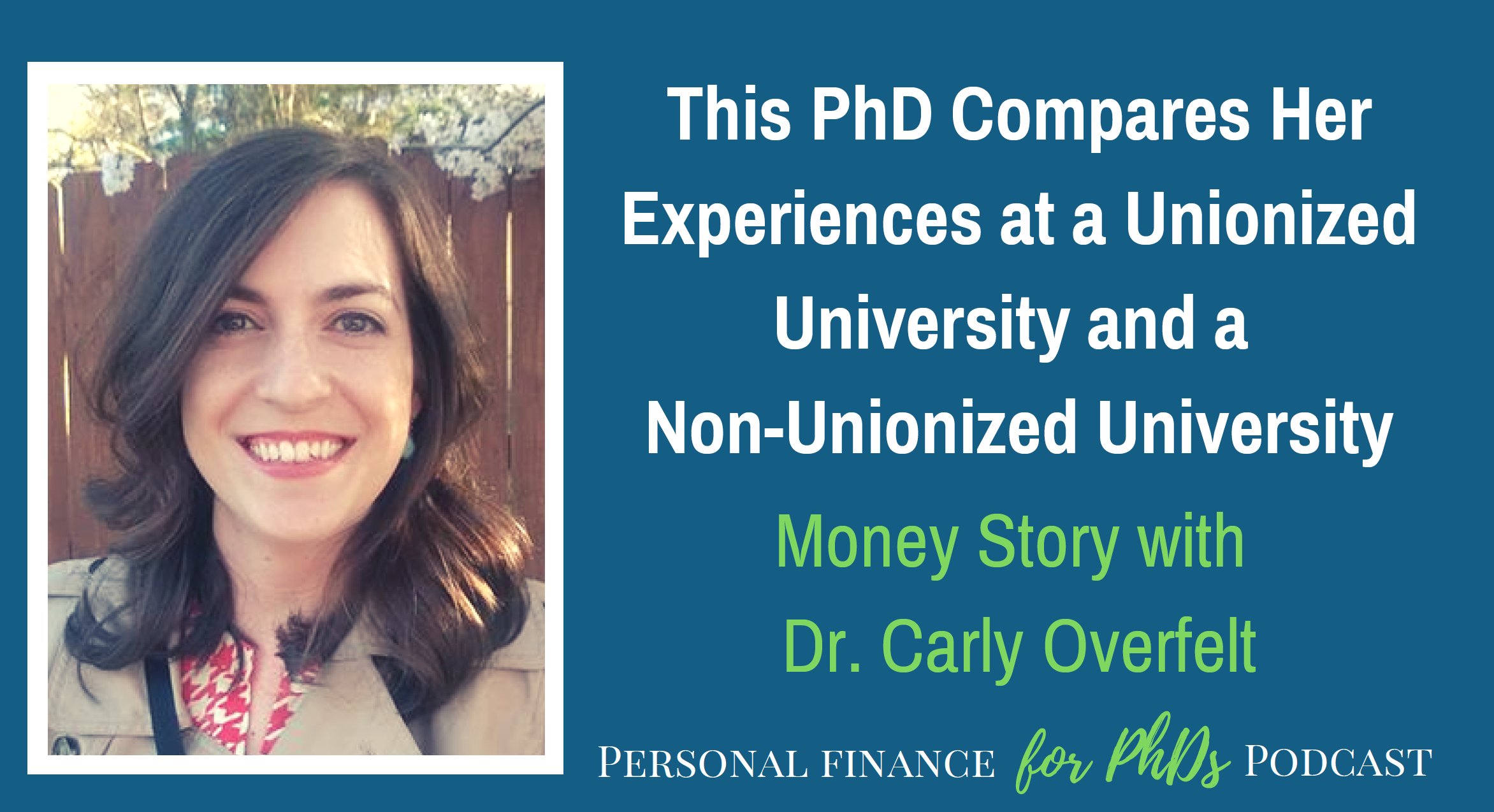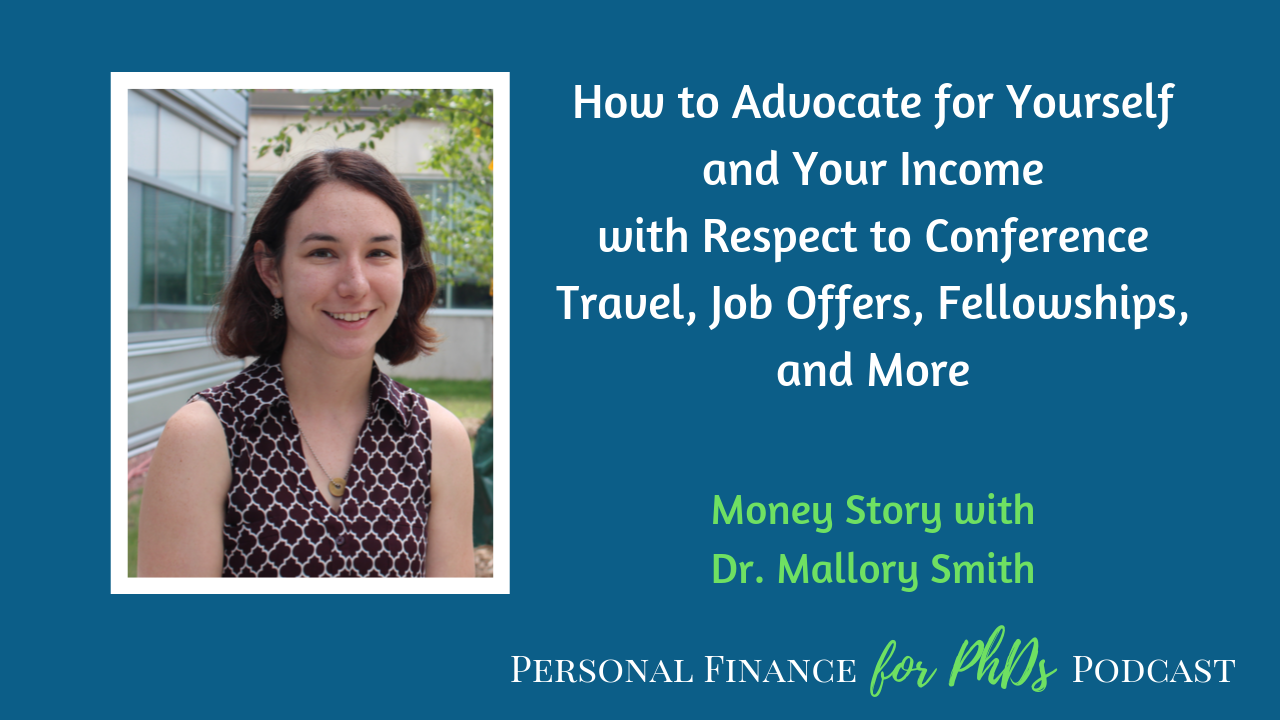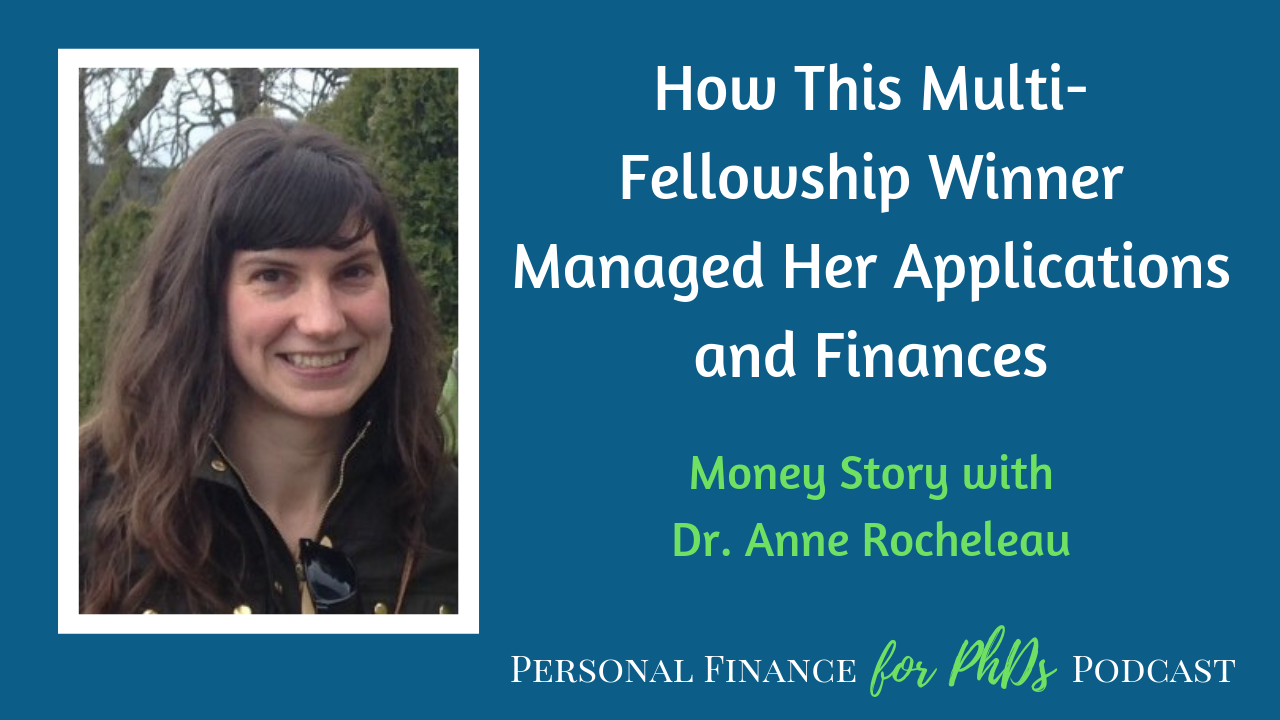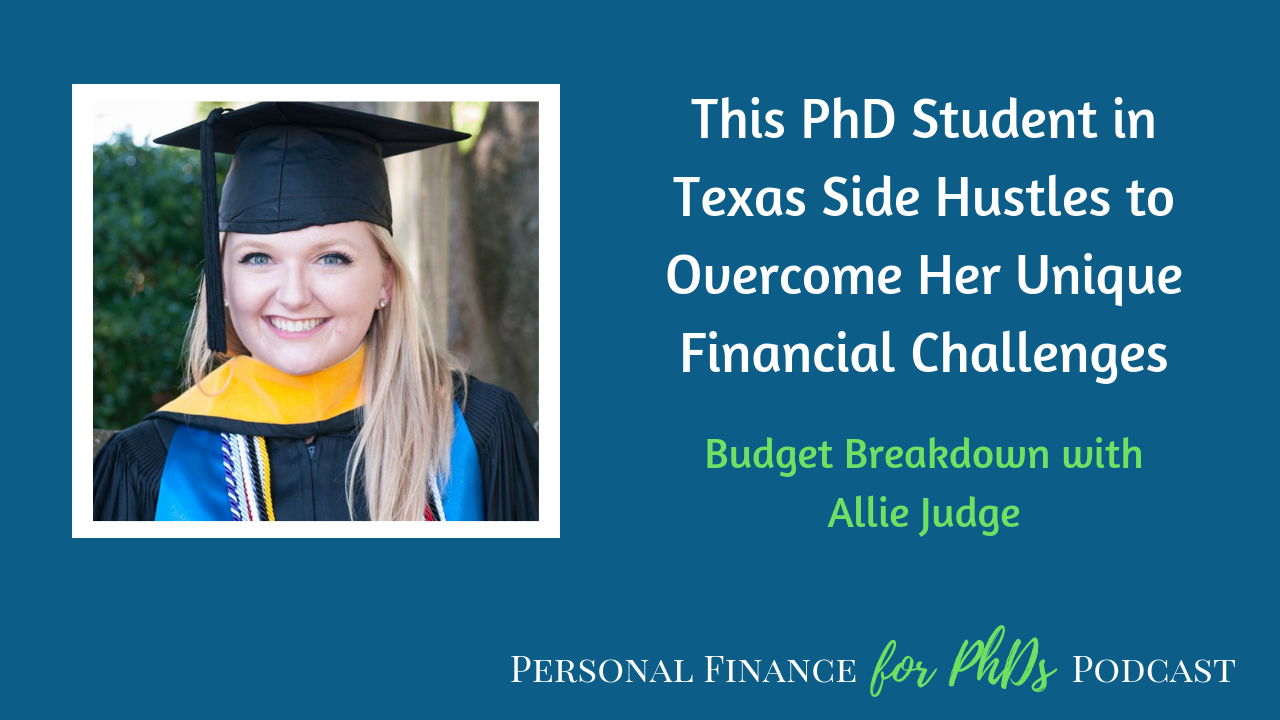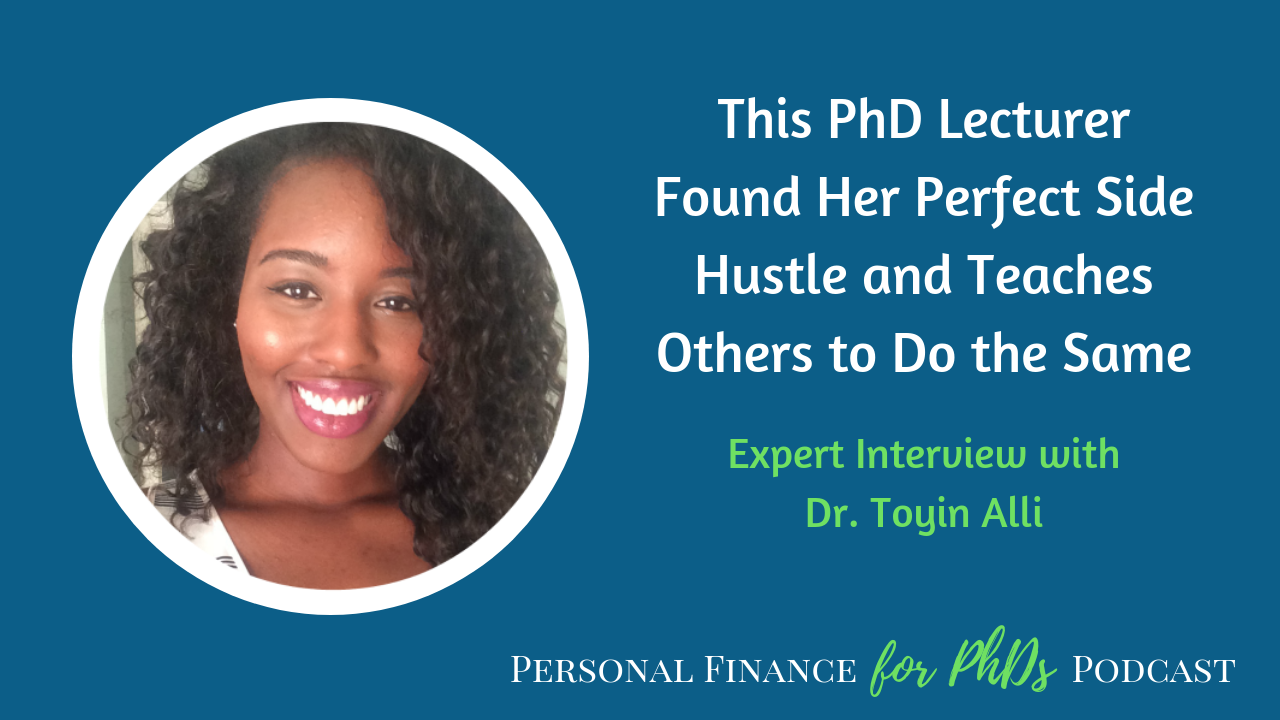In this episode, Emily interviews Dr. Echo Rivera, a PhD in community psychology and founder of Creative Research Communications. Echo is an expert in effective presentation, and she teaches these skills to other academics and researchers. Emily and Echo discuss the various ways effective presenting can improve an early-career PhD’s finances, such as through career advancement and networking in person and online. Effective presentation design can even help you feel more confident and move past a fear of public speaking, as it did for Echo.
Links Mentioned in This Episode
- Creative Research Communications
- Find Dr. Echo Rivera on Twitter, Instagram, LinkedIn, and YouTube
- Personal Finance for PhDs: Sign up for personal finance coaching
- Personal Finance for PhDs: Wealthy PhD group program sign-up
- Personal Finance for PhDs: Podcast Hub
- Personal Finance for PhDs: Subscribe to the mailing list
Teaser
00:00 Echo: Try to invest in yourself as soon as you can. Especially for something like effective communication skills, effective presentation skills, the earlier you can get in on some type of professional development, it’s going to pay off more in the long run.
Introduction
00:21 Emily: Welcome to the Personal Finance for PhDs podcast, a higher education in personal finance. I’m your host, Dr. Emily Roberts. This is season 4, episode 19 and today my guest is Dr. Echo Rivera, a PhD in community psychology and expert in effective presentation design. During graduate school, Echo began teaching herself effective presentation design to help her move past her own anxiety around public speaking. Through her business, Creative Research Communications, she teaches academics and researchers how to present effectively. We discuss the various ways effective presenting can improve your career prospects and financial bottom line. Without further ado, here’s my interview with Dr. Echo Rivera.
Will You Please Introduce Yourself Further?
01:05 Emily: Joining me on the podcast today is Dr. Echo Rivera, and I’m so pleased to have Echo on. We’ve been in each other’s circles for a number of years now, but this is actually the first time that we’re talking together live. I’m really excited to have a conversation with her about what she does and how it can improve early career PhDEs finances. So Echo, thank you so much for coming on the podcast.
01:26 Echo: Thank you so much for having me. I’m really excited to be here.
01:29 Emily: Awesome. So please tell us a little bit more about yourself.
01:33 Echo: Yeah, so just real briefly, I have a PhD in community psychology from Michigan State University and immediately after finishing my PhD, I got a job as a research associate at a nonprofit research and evaluation center and that’s in Denver, Colorado. I worked there for three years and then quit so that I could pursue my own business full time. That’s called Creative Research Communications and I’ve been doing that for about one and a half years. That’s the nutshell.
02:09 Emily: So one and a half years full time, but you started this sometime before you left your job?
02:14 Echo: Yeah, it was the side hustle. Something I worked on on the weekends or when I got home after work.
02:20 Emily: Yeah, we talk plenty about side hustling on this podcast. Echo and I met through the self employed PhD community originally, which now is part of Beyond the Professoriate run by Jen Polk and Maren Wood. If any of you are self employed in your side hustle or your full time thing, or interested in that, that’s a great community to join to have more conversations with me and people like Echo and others who are pursuing the same kind of thing, so definitely want to plug that.
More About Creative Research Communications
02:48 Emily: All right. So awesome. You’re now self-employed. Tell us a little bit more about what your business is, like what do you actually do?
02:56 Echo: Yeah, so I help academics and researchers and scientists and basically people in this higher education world, I help them communicate their work more effectively and creatively. So that’s mostly through slide presentations, like PowerPoint, Keynote, Google Slides, stuff like that, because it’s just a great place to start for a lot of people, but it also includes things like comics and infographics and visual abstracts and just things that are beyond a standard conference presentation or publication. Today I’ll be focusing on presentations, but a lot of it’s about creativity.
03:36 Emily: Gotcha. What inspired you to go into this line of work?
03:40 Echo: In undergrad I was really torn between going into graphic design for my major or psychology for my major. I had already transferred universities and it was already going to take me five years to get my bachelor’s degree and it would have taken even longer if I switched my major to graphic design. So I basically just went with psychology and I enjoyed research. My degree is in research, not clinical psychology, so I just kind of went with it. But I never really left that graphic design world. I took classes, I learned on my own, and in grad school, I just kind of started merging those together, using graphic design for things like participant recruitment flyers and toolkits, presentations, obviously. I did comics for a blog. It just kind of always was merged for me, and I really loved it, so I made it my business.
04:37 Emily: Yeah. Well, it is kind of a leap from applying your talents and doing something for your own work, to teaching others how to do it or doing it for other people. Now which one do you do or is it both?
04:49 Echo: It’s both. I do design presentation slides or comics or things like that for others. I also train people to do it and I have sort of different options, like an online course or one-on-one sort of more mentoring style. I try to help everybody where they’re at, and what their available time and resources look like. So I offer that that wide range.
05:13 Emily: Gotcha. Very, very exciting. I had another interview recently in season three with Dr. Gaius Augustus who told a similar story, I’m sure you know Gaius, of how he also was an artist and a scientist and over time has found a way to combine both of those two passions. So yeah, really cool that we’re having another episode around that same idea.
Effective Presenting and Finances
05:35 Emily: But Echo, why are you here on a personal finance podcast talking about effective presenting? How can the skills that you teach people, if people are able to present more effectively, how can that actually affect their bottom line?
05:52 Echo: I’m so excited to talk about this, especially because I haven’t really talked about this on my blog, yet, so this is kind of the first time I’m really out there telling people this, but I need to, because effective presenting it can help you in some pretty obvious ways, but also some more indirect ways that you might not have thought about. The things I want to talk about today are how effective presenting can help you with the obvious thing, which is a job talk. Pretty important. And some of the less obvious things, like networking and promotions, once you have a job.
Situation #1: Job Talks
06:29 Emily: Excellent. Yeah, let’s get started with the obvious one. If you are finishing up your PhD, finishing up a postdoc, finishing up a job, you’re looking for something new. Pretty common. If you’re going to another research position, certainly within academia, but also outside of academia that you’re going to have to give a job talk or research talk in some capacity. So you’re presenting your past work, maybe you’re even presenting a proposal for future work at that particular institution. That’s kind of the context of what we mean by a job talk. So what can people do when they’re preparing for a job talk to make it killer? And why would it matter if they did a great presenting job with that? How would that actually affect whether or not they get the position?
07:10 Echo: Yeah, yeah. Let’s talk about all of that. So why does this matter? I’ll start there. The reason why this matters is because once you get to that point, once you’re invited for an interview, the job talk is probably one of the most important things. I have even a couple of quotes for you. Karen Kelsey, from The Professor Is In, who is amazing and if you don’t know about her website definitely check it out. In one of her webinars about job talks, she had a quote, this is sort of like a loose quote, but she said “you cannot bomb the job talk and still get the job.” She just came right out and she just said it. You’re not going to get an offer if you bomb the job talk. That’s how important it is. And even Rick Reis, I might be saying his name wrong, from Stanford, he’s called Tomorrow’s Professor, he said the job talk is, quote: “Perhaps the single most important thing you’ll do during an academic interview.” So you know that’s a lot of pressure. I mean a lot rides on this job talk and —
08:22 Emily: I just want to jump in there, because it’s a little bit almost counterintuitive to think that it would matter that much, right? If you can’t do this one thing, you are disqualified from this new position. Because maybe giving presentations is not going to be a huge part of that actual job. Maybe doing the research is what it is or maybe it’s teaching, which is a little bit different from a presentation kind of scenario. The one-on-one interviewing that you do over the course of the interview visit, all that stuff matters as well. And maybe why is the job talk important in particular? I mean, we’re not asking why, we’re just saying it is really, really important. It’s a little bit counterintuitive because maybe you’re not thinking that that’s a huge part of what you do. I mean, what percentage of your time do you actually spend presenting, as like a researcher or an academic? It’s pretty small ,yet a lot rides on those singular moments, right?
09:17 Echo: Yeah, absolutely. And I think part of it is…I don’t know how it was 10, 15 years ago, but we all know how much more competitive the job market is now. It’s an ultra competitive situation and it is one way where you can set yourself apart from other people who are also there or doing a job talk. So that is one reason I think it’s so important. But I’m sure it’s a complex combination of reasons too.
09:50 Emily: That was the obvious thing, right? You’ve got to nail the job talk, of course, and the skills that you teach are going to help the candidate do that. Outside of the job talk scenario, what are some other ways and other scenarios where effective presenting can really help your finances?
Situation #2: Networking
10:08 Echo: Networking is one of the ones that might surprise people, because it is a little more indirect. This is something that will help just about everyone. I know we were just talking about a job talk and an academic interview, which mostly applies to academic jobs, but in terms of nonacademic jobs, as well as academic jobs, your network is crucial. It’s crucial for getting opportunities, whether it’s for publications or projects or grants or jobs even — your network is really crucial at pretty much any stage of your career. So how do you network? There’s a lot of tips out there, there’s a lot of suggestions, and one way is through presentations. So how? If you think about it, conferences are actually an excellent opportunity for increasing your network, which I think a lot of people already know. I don’t think that’s new and surprising. What people might not think about is that if you have a visually engaging, effective presentation, one that is organized, one that is easy to follow, that people understand that doesn’t feel overwhelming, isn’t just all text, isn’t just bullet points, it doesn’t have word clouds, doesn’t have all the data, it’s an organized narrative — people will be more likely to come up to you and talk to you after your presentation and you’re going to stand out more. If you think about it, one hard part about networking is just making that introduction. When you want to meet someone new but you’re nervous, you don’t know how to break the ice, you don’t know what to say — if you have a presentation, you’ve given that to people. People can now come up to you and they know what they want to say — “your presentation was great, your slides were great, I loved your presentation” — and it breaks the ice and people have already connected with you because you presentation was great. It speeds all that up along and encourages ways to build your network.
12:17 Emily: I totally, totally agree with you. Obviously as someone who presents as part of my living, I agree with you that it’s, it’s a wonderful way to start networking. Another thing, a little bit to take a step back from maybe an individual presentation that you give, if you as a researcher, as a PhD, increase your confidence around presenting because you’ve learned how to create effective visuals, you’ve done some practicing of your actual delivery of presentation, wouldn’t you be more likely to put your name in to do this sort of thing more and more and more, if you build up your skills and you feel competent. It’s kind of a stereotype, but public speaking is people’s number one fear, right? It’s like the worst, most intimidating thing that you would possibly do. Many, many people think that. So instead of shrinking back from those opportunities, if you have confidence around that, especially if you’ve been trained in some capacity, then you can again, put yourself out there, put yourself forward, and be increasing your network, because you’re just having more and more of those opportunities, where maybe you wouldn’t, if you weren’t feeling so confident about it.
13:23 Echo: Absolutely. I’m really glad that you actually brought that up because I’ve really started all of this — my own personal training for effective presenting, because I was terrified of public speaking. I was scared. I was nervous. I would throw up before a presentation. I was really high on that anxiety scale. I started doing visual presentations and storytelling and academic presentations almost as a way to distract from myself and help myself just get up on the stage hoping people would look at my slides and not mean. Then, just over time people would compliment me and I would be surprised and not believe them at first, but then, over time, it really did build up my confidence and now I love it. Now I love public speaking and giving presentations because I know people are going to engage with it. It’s going to resonate with them, they’re going to be able to understand it and it goes really well.
14:23 Emily: Yeah, and this ties into the job talk part of it as well. If you’re feeling confident about giving that job talk, you’re going to come off that much better in the interview. Something I’ve also seen, and this is sort of regarding networking as well, in the past few years since I’ve been giving presentations at universities, I see people pull out their phones or their iPads and take photos of my screen. I’m assuming it’s usually for their own like future reference or something like that. But if you, and I’m not saying I do, but if one has really beautiful visuals up on that screen, that’s a sharing opportunity, in terms of social media. We’ve all seen, if you follow a conference on Twitter, people are posting images of slides from presentations and so forth, so if you have a particularly beautiful, engaging, clear, as you were saying earlier, slide, that’s something that could even expand that network beyond the people in the room.
15:18 Echo: That’s such a great idea. Yeah, that is so true. I definitely see people sharing slides from conferences they’re at all the time on Twitter and the ones that get a lot of engagement and excitement are definitely the ones I would say are more well-designed compared to the ones that are all text, small text, bullet points, that kind of thing.
15:38 Emily: Yeah. The text ones might be getting some photos in the room because they’re like, “Oh, I can’t read all of this and the amount of time it’s going to be up, I need this for future reference”, but the shareable ones are definitely going to be the more beautiful and clear ones.
Commercial
15:53 Emily: Emily here for a brief interlude. As a listener of this podcast, every week you hear strategies that another PhD has used to improve their financial picture. But listening and learning does not automatically translate into action in your own financial life. If you are ready to change how you think about and handle your money, but need some help getting started, I can be of service. There are two main ways you can work with me to create and implement a financial plan tailored for you. First, I offer one-on-one financial coaching, either as a single session or a series, as you make changes over the long term. You can find out more at PFforPhDs.com/coaching. Second, I offer a group program called The Wealthy PhD that is part coaching, part course, and part community. You can find out more and join the wait list for the next time I open the program at PFforPhDs.com/wealthyPhD. I believe it’s possible to succeed with your finances at every stage of PhD training and throughout your career. Let’s figure out together how to make that happen for you. Now, back to the interview.
Situation #3: Promotions
17:07 Emily: Okay, so what was the third way that effective presenting can affect one’s bottom line?
17:13 Echo: The other way was promotions. This works for academic context, but also nonacademic context. A lot of people think that, okay, so presentations are great for a job talk, itt helps me get the job, but once I have it, now it’s time to worry about tenure. And that is all about publications and that’s not a good time to learn how to present effectively. And yes, publications are important. I’m not trying to diminish that at all, but I think people don’t realize how presentations can help with the other part of the tenure package. So for example, I just had a student in one of my online courses, she’s an assistant professor. She just did her third year review letter, which she called, a mini tenure package and she wrote in there in her section about teaching effectiveness, she talked about the professional development that she took, how it helped her teach her undergrads and how she was evidenced based principles that she learned in my course for learning and memory and that kind of thing. And she had quotes from her student evaluations and her students even said things like “the PowerPoints were the best part of the class” — is a loose quote. But it was something like that where they said PowerPoint slides were the best part of this course. And so it can help you in that area. It can help you with maybe the broader impact, if you have to talk about that. It can help you with those other areas if you just frame it that way.
18:49 Emily: Yeah, absolutely. I mean, this all again goes back to effective communication of which presenting and visuals and all of that are components of that. But just effective communication in general, of course that’s going to help you maintain the job you have, get promotions at the job that you’re in, not just in a new job scenario. Yeah. Great point. And again, I actually want to go back to the confidence aspect that we were talking about earlier because I’m thinking, okay, we’ve been talking a lot about landing a job, keeping a job, and that’s career-related, which is obviously within the scope of personal finance. But I’m also thinking about like negotiations. I don’t know if you’d necessarily be using visuals in a in a negotiation session with your potential supervisor or boss, or your existing one, b,ut again around the confidence, if you’re just building up your confidence in talking in front of people, in presenting a case to other people, that is an enormous asset to have with you when you go into a negotiation situation.
19:53 Echo: Yeah, and I would actually agree with that. Part of effective presenting, a lot of people are thinking probably about design, about typography and text and text size and colors and that kind of thing, which is definitely part of it. The other part is also the story-boarding, which is just the word I use to describe organizing your content, what order are you going to say things, what are you going to say, what level of detail. And learning that for presentations is a great place to start, but then it starts helping you just to make good arguments in other areas. I’ve heard this from my students that it even helped with things like grant applications because you learn how to set up your argument and maybe it’s not an argument, but you still learn how to hook the audience from the first thing that you say. So yeah, if you want to negotiate for a promotion or a raise, you’ll have more skills to do that in a more narrative, storytelling kind of way. A lot of academics were trained to do fact, fact, fact, like just a list of facts, just a data dump. And that’s not an effective way to communicate. That wouldn’t be an effective way to communicate for a promotion, probably. You would want to start with more of an engaging opening, so to speak.
21:23 Emily: Yeah. I’m really seeing how, I mean, we started talking about effective presenting, but how these skills that you’re talking about are permeating so many different areas of professional life.
21:35 Emily: Okay, I think we’ve made a good case. People care about the skill set, they want to get better at it. Really quickly, what are some tips that you have for people to do a better job in this area that they could implement right away?
Presentation Tips You Can Implement Today
21:52 Echo: Yeah. I think there’s some things that you’ve heard before so I won’t spend too much time on them. I’ll just reinforce them a little bit. Less text. Yes, even academics want less text on your slides and you want to use bigger font sizes. A lot of people they have too small font sizes. The other thing that I wanted to mention, because a lot of people feel like the problem is PowerPoint, and that they have to spend a lot of money on a fancy program like Prezi, or they have to take a lot of time to learn a new program. I have good news and the good news is that you don’t need to do that. PowerPoint is actually fantastic. You can absolutely make visually engaging presentations with PowerPoint or with Keynote. So if you’re an Apple user, Keynote is great as well. Google Slides is okay. It has fewer features, and most people have PowerPoint anyway. So PowerPoint is great. You can totally use PowerPoint.
22:53 Emily: Yeah. So it turns out the tool was not the problem, it’s our usage of the tool.
22:59 Echo: Exactly. And the other thing I wanted to mention was habits. You probably also know that you should be practicing your presentation and that you should be starting your presentation earlier than say, on the plane ride to the conference. I know —
23:16 Emily: You don’t say?
23:17 Echo: I know it happens, I’ve done it, so I totally get it, I’ve totally been there. But if you start earlier, it doesn’t have to be a lot of time, but if you start earlier and give yourself time in between revisions, you’ll be surprised at how much better your presentations turn out, because I think a lot of presentations are ineffective because people are cramming in it at the last second.
23:40 Emily: Yeah, it’s just something that hasn’t been thought through well yet.
23:44 Echo: Yeah, exactly.
Final Words of Advice
23:46 Emily: The final question that I like to ask everyone who comes on the podcast is what is your best financial advice for another early career PhD? And that could be related to what we’ve been talking about today or it could be something totally different.
24:00 Echo: Yeah, I think, partly related to what we’re talking about is try to invest in yourself as soon as you can. Especially for something like effective communication skills, effective presentation skills, the earlier you can get in on some type of professional development, it’s going to pay off more in the long run. For example, if you learn it now, then you’re going to have those skills when it comes time to make your job talk presentation, you’re teaching demo. You’ll already know how to make good slides for that and a good presentation from start to finis,h rather than trying to do all of that at the last second. And the earlier you learn it, the sooner your presentations will be better and more effective, and then you can sort of continue to improve on that over time. That’s sort of a tip I wanted to share.
24:53 Emily: Yeah, totally, totally agree. And the thing is, the listener might be thinking, especially if they’re still in training, “I am investing in myself right now, I’m taking this huge pay cut to like be in grad school or be doing a postdoc, that is investing in myself.” But the unfortunate reality, as we mentioned earlier, is that a lot of essential skills for the workplace, and even for the job you have right now, are not being taught by universities or by advisers or by departments. Maybe they are in some pockets, I don’t want to say that’s a universal thing. Maybe you at your university have a course on public speaking. Maybe there’s something available to you, that’s awesome if you can take advantage of that. But probably most places it’s not available, or it’s not really a good time investment, maybe you have to put way too much time into it than what would be effective for you. So I totally agree that it’s oftentimes very necessary to go outside the university environment to pick up these skills. And the earlier you do it, of course, as you said, the more and more you can deploy those skills over the years and hone them and continue to develop them.
Find Dr. Echo Rivera Online
25:58 Emily: Speaking of which, Echo, how do people get them to get you to teach them some of these skills that we’ve been talking about?
26:06 Echo: Yeah, so I hope that I’ve excited people about learning presentation design and how to be an effective presenter because I have tons of stuff on my website. I have free courses, I have tons of blog posts, I have some download-ables in my blog posts, I have a YouTube channel. All of that you can find at echorivera.com so it’s just my name, Echo Rivera dot com. I’m also really active on social media. I’m on Twitter and Instagram and my handles are @echoechoR. Find me on social media, check out my website. I’d love to connect and I’m just kind of curious what people thought of this podcast and if they learned something new or just want to chat, so don’t hesitate to reach out.
26:59 Emily: Yeah, absolutely. When this episode comes out, I’ll be tweeting a bunch of times that week and tagging Echo and certainly reply to any of those and tell us like what you thought about this. Maybe this is a surprising thing for us to talk be talking about on a personal finance podcast, but as you can see, it plays into your finances in so many different ways and these skill sets are so essential. Echo, thank you so much for, for being my guest today.
27:24 Echo: Thanks so much for having me.
Outtro
27:26 Emily: Listeners, thank you for joining me for this episode. PFforPphDs.com/podcast is the hub for the Personal Finance for PhDs podcast. There, you can find links to all the episode show notes and a form to volunteer to be interviewed. I’d love for you to check it out and get more involved. If you’ve been enjoying the podcast, here are four ways you can help it grow. One, subscribe to the podcast and rate and review it on Apple podcast, Stitcher, or whatever platform you use. Two, share an episode you found particularly valuable on social media or with your PhD peers. Three, recommend me as a speaker to your university or association. My seminars covered the personal finance topics PhDs are most interested in, like investing, debt repayment, and taxes. Four, subscribe to my mailing list at PFforPhDs.com/subscribe. Through that list, you’ll keep up with all the new content and special opportunities for Personal Finance for PhDs. See you in the next episode, and remember, you don’t have to have a PhD to succeed with personal finance, but it helps. The music is Stages of Awakening by Podington Bear from the Free Music Archive and is shared under CC by NC. Podcast editing and show notes creation by Lourdes Bobbio.
